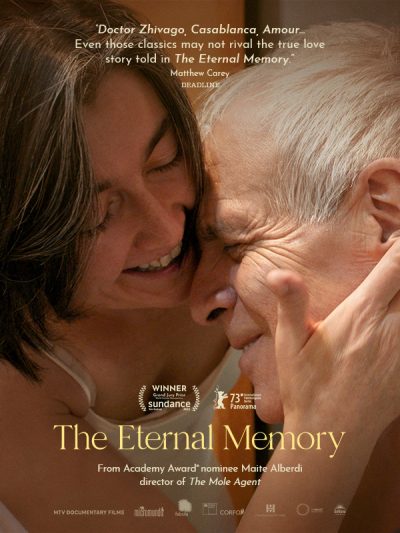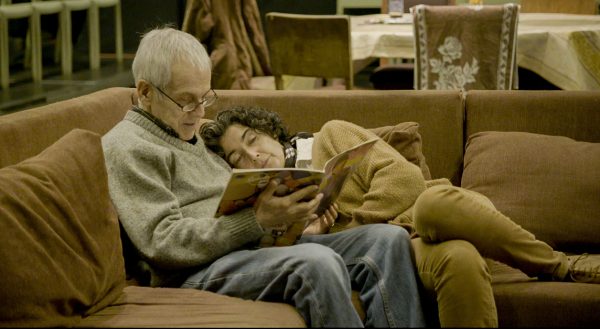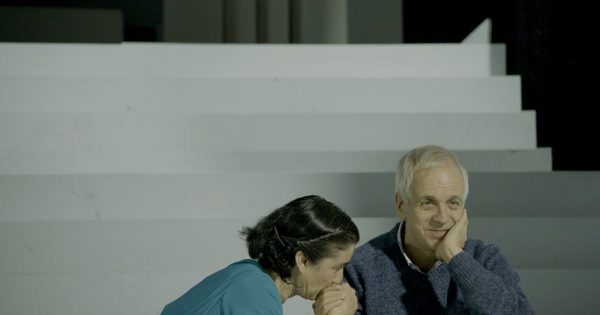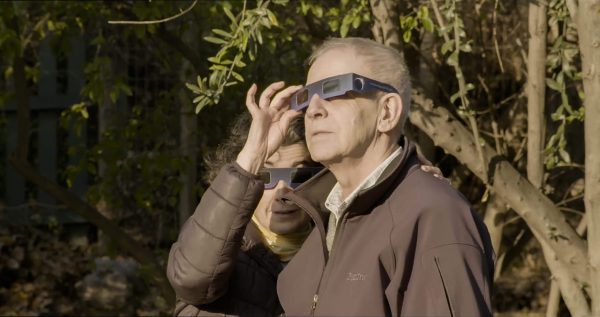‘Eternal Memory’ seeks to preserve as much as possible for as long as possible

“The Eternal Memory” (“La memoria infinita”) (2023). Cast: Augusto Góngora, Paulina Urrutia, Javiera Góngora. Archive Footage: Raúl Ruiz, Cristobal Góngora. Director: Maite Alberdi. Screenplay: Maite Alberdi. Web site. Trailer.
Góngora distinguished himself as a journalist during the days of Chile’s Pinochet regime. He courageously exposed the atrocities of the brutal, self-serving right-wing dictator who assumed power during the nation’s 1973 coup d’etat, making the public aware of the rampant barbarity that left many dead and authorities morally bankrupt. He later played a pivotal role in helping to restore the country’s artistic and cultural heritage after its return to democracy in 1990 with the autocrat’s ouster, becoming one of Chile’s most prominent authors. He accomplished much during a difficult time, rising to prominence in the public eye.
Urrutia, meanwhile, developed quite a reputation of her own as an actress and as Chile’s Minister of Culture and the Arts. She occupied a high-profile position in the nation’s arts community, especially at a time when the country needed to reinvigorate its long-starved cultural aspirations. She did much to help bring back what had been lost or lying dormant for so many years.
After the dissolution of Góngora’s first marriage, he became romantically involved with Urrutia, beginning in 1997. Together, Augusto and Paulina became quite the power couple. In many respects, they embodied the concept of loving devotion, setting an example for others in terms of how to make a relationship work. They truly came across as partners who had it all.

That all changed drastically in 2014, however, when Augusto was diagnosed with Alzheimer’s Disease at the age of 62. It was a devastating revelation, the kind of development that often causes many of those afflicted with it to flee into isolation. But Góngora refused to handle it that way. As someone who was accustomed to informing the public about the truth behind troubling matters, he refused to go into hiding. He wanted to help educate the public about the illness in terms of how it progresses, how it can be treated and how it impacts people, including both its sufferers and those around them. And, as a devoted partner, Paulina went along with this plan, getting proactively involved in tending to his well-being.
Those decisions led to the making of this documentary, a showcase for how Alzheimer’s affected both Augusto and Paulina individually and collectively. Filmed over the course of several years, the picture follows the progression of Góngora’s illness, with an emphasis on how Paulina earnestly endeavored to help Augusto retain as much of his memory as possible for as long as possible. Her efforts are truly noble, and Góngora bravely fights to retain those recollections. And, through this, viewers witness the undying adoration between the two, a romance on par with many of the silver screen’s all-time greatest love stories.
But, no matter how much effort they put into sustaining their relationship and warding off the ravages of this devastating disease, unfortunately there’s no stopping the illness from taking its toll on Augusto’s health and the nature of the couple’s connection. While it’s heartening to witness Paulina’s dedication to her love for her partner and her commitment to supporting his continued vitality, it’s impossible to ignore the inevitable decline that takes place – and her growing concern that there will come a time when there’s nothing she’ll be able to do to help him. Even worse, though, is the fear that there will also come a time when he’ll no longer recognize her, perhaps the most unnerving concern when it comes to losing the person with whom she was supposed to live out her days.
What is one to make of circumstances like these? That seems like an almost-unanswerable question. Indeed, how does one cope with the painful loss of one’s soul mate, particularly when it materializes through the kind of slow-motion deterioration taking place here?

That’s what can happen when we employ our beliefs to fulfill a particular goal, a product of the conscious creation process, the philosophy that maintains we use them to manifest the existence we experience. It’s not clear how many of us share in this notion (or have even heard of it, for that matter). But the results shown here illustrate just how effective it can be in pursuing such a goal.
For example, Augusto and Paulina make it plainly apparent that an illness like this need not be the end of a relationship. Quite the contrary, in fact. This film shows just how much they remained in love and committed to one another throughout much of the progression of Augusto’s demise. It shows how that commitment may have even contributed to sustaining his relative lucidity for as long as he did. There’s a lot to be said for the value in that, particularly since it began with their belief – their faith – in the ability to carry out that notion.
Despite that, though, caregivers are faced with challenges particular to conditions like this, especially when it comes to things that we may take for granted as givens and that we might find it difficult to believe that others forget. That’s depicted in one scene here where the couple prepares to watch an eclipse. Paulina encounters difficulties in coaxing Augusto into wearing a pair of protective glasses. He had forgotten the need to wear them, even to the point where he couldn’t understand all the fuss about this, but Paulina needed to be persistent in getting him to put them on to avoid injury to his eyes. Obviously, even a firm belief in being able to play the role of caregiver can have its share of issues, no matter how strong our resolve to see it through.
Playing the role of caregiver can also create compromises for those undertaking such a task. For instance, early on after Augusto’s diagnosis, Paulina sought to continue her acting career, a much-needed diversion to help her keep from losing herself. She even tried to keep Augusto involved in that venture by bringing him with her to rehearsals. However, as time passed and his condition worsened, she had to adjust her beliefs to align with the prevailing priorities. That couldn’t have been easy, given her love of acting. But, at some point she had to ask herself, which love was greater – that of her husband or that of her craft?
Of course, the bigger underlying condition here is why would anyone use their beliefs to create such a condition in the first place? That’s a valid point, but the reasons behind it are one’s own, something personal that’s essentially no one’s business other than that of the individual who materialized it in the first place. However, there are a number of possibilities behind this, many of which we can speculate about but none of which should be judged.

For example, as in this case, the appearance of the condition could rest with the very objectives previously noted – creating greater awareness of the illness to help promote care and treatment options, perhaps with the ultimate objective of finding the cause and cure. On a more personal level, it could relate to an exit from this reality where the transition to what comes next is cushioned by a lack of conscious awareness, one designed to “soften the blow” about the passage that comes with death. In a similar vein, it could be a vehicle for moving on to another reality or realm of existence that only the experiencer is aware of, a kind of personal journey into the unknown. Or there could be a host of other options that underlie what happens as a result of the onset of this illness. In any event, though, whatever the root cause and associated beliefs might be, they’re all equally valid and open to exploration. Whatever course is selected, it’s seemingly viable to the individual who has chosen it, without criticism or judgment, even if it’s something we would never choose to use our beliefs for.
What happens when something occurs that threatens to steal our precious recollections? That’s one of the tragedies that can come with various forms of dementia, such as Alzheimer’s Disease, and the effects it can have on a couple like Augusto and Paulina. Their story is sensitively recounted in writer-director Maite Alberdi’s moving documentary, a film that will simultaneously warm and break your heart. In telling their tale, this title explores the importance of preserving one’s memories as a measure of one’s identity and accomplishments, both personally and professionally. In Góngora’s case, that involves the depth of his love for his wife, family and friends, as well as the critical role he played in educating the Chilean public after the 1973 coup and the regime’s subsequent collapse, recollections worthy of being preserved and not lost to the ravages of time and illness. This Oscar nominee for best documentary feature and its designation as one of 2023’s top documentaries by the National Board of Review is a striking piece of filmmaking, one that’s sure to touch virtually anyone who watches it (but be sure to keep those hankies handy). When we consider what can potentially be lost under circumstances like these, any efforts made to prevent that are truly heroic steps to be commended, both for victim and caregiver, and this film does an outstanding job at making that known, both in this case and as a practice to be employed whenever comparable conditions arise.
No one understands the ease with which we can lose what we hold most dear as those who live with these conditions on a daily basis, either as a victim or caregiver. But, as this film illustrates, it’s possible to fight back, to help stave off the inevitable, as long as we believe in the possibility. Fewer acts could be viewed as courageous as this, but the payoff can be incalculable, even if it doesn’t last forever. Situations like this make clear how important it is for us to hold on to as much as we can for as long as we can. Even if such ventures end up only being fleeting, at least they can add much to our lives for whatever time they last. And, with what’s impending in these cases, that can be just what we need to help us get through to the next stage.
Copyright © 2024, by Brent Marchant. All rights reserved.



